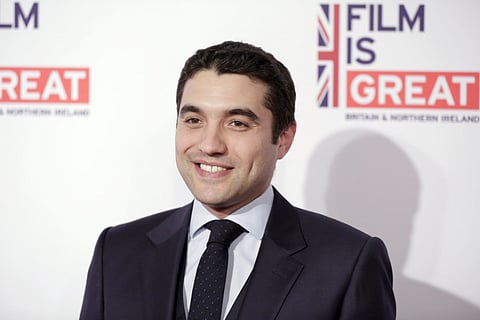Oscars 2016: Naji Abu Nowar’s winning streak
Director of the Abu Dhabi-funded foreign language category nominee ‘Theeb’ tells us the one accolade he’s received that beats the Oscars any day

Jordanian-British director Naji Abu Nowar hasn’t stopped pinching himself since 2014. That’s the year he released his groundbreaking debut feature film, Theeb.
Earlier this month, the Bedouin survival flick became the first Arabic title to win a Bafta award, snagging the outstanding debut by a British writer, director or producer prize. On Sunday night, Nowar will find out whether he’s won another mammoth accolade — the Oscar for best foreign language film.
Set in 1916, the stripped-down story — filmed in Jordan’s deserts and starring amateur actors from a real Bedouin clan — follows the harrowing journey of Theeb, portrayed by then 11-year-old Jacir Eid. (Nowar, in his early thirties, said filming with children, animals and non-professional actors in a remote location meant trouble; most of the time, the crew were getting stuck in cars, avoiding flash floods and escaping sandstorms.)
Theeb was supported by the UAE’s Sanad fund and screened at the Abu Dhabi Film Festival (ADFF) in 2014. That same year, Nowar had been named the Variety filmmaker of the year, and Theeb had won the Orizzonti Award at the Venice Film Festival.
“Never in my wildest dreams [did I expect that],” Nowar told tabloid!. “We started the festival pinching ourselves that we were even there. We showed the film, and we got a standing ovation for 10 minutes, and that was beyond our wildest dreams and more than we could ever ask for.”
Before the Oscars, we caught up with Nowar to hear how his life has changed since Theeb and about the one accolade he’s received that beats the Oscars any day.
What does it mean for Theeb, a Jordanian-made, Bedouin-centred film, to be the first Arab film to be making these strides?
We are very proud to showcasing the potential of artists from our region. But at the same time, we are just a drop in the ocean of amazing talent in Mena[Middle East and North Africa region]/Gulf cinema. The world will soon see all the amazing artists that are out there.
What would it mean to you to win at the Oscars?
It would be great to win an Oscar because it will help boost our region and kick-start a surge in growth in the industry. Although people are congratulating us a lot we have not had offers from the Mena/Gulf region to help finance our next projects. So hopefully a win will encourage financial support for our next films.
At ADFF, you said that this film was made for the Arab world. Do you still feel that’s true?
I hope the film is made for the world, but it was important to me that the Arabic-speaking world like the film and feel it was authentic. I wanted their acceptance.
This is your first feature film. It’s garnering worldwide attention. What kind of pressure does that put on you?
None. I love what I do and enjoy every second. I do feel a little pressure to win because I feel all the hope coming from the public and I don’t want to disappoint them. But in the end of the day there’s nothing I can do to determine the outcome on the 28th [of February], so I am just going to enjoy it. Come the 29th I will disappear and you won’t hear from me again until I premiere my next film.
When did the seed for Theeb first get planted? Where did the idea for a Bedouin survival film come from?
It came from [writer and producer] Bassel Ghandour’s wonderful short film script. I was entertained, which is all a director really does, he enjoys watching the great work of other, more talented people.
What was your relationship with Jacir like, as director and actor?
Jacir is a natural talent, so I just tried to encourage his confidence, explain what the scene was about and get out of his way. Sometimes the best thing to do with a great talent is to just let them do their thing and not interrupt them. Directors often find this difficult because they like the sound of their own voices too much. It’s tough to be silent, when you are a control freak. But with a talent like Jacir this is what you have to do. Every actor is different and needs different things.
What were some of the lessons that you learned on this journey?
The only thing I learned was just how little I know about filmmaking and how hard I have to work to improve. This was my first film and I have realised that I have an exciting world of filmmaking open to me. I can’t wait to get back to work.
You’ve spoken about being predestined to join the army, and choosing another path for yourself. Was that an easy decision to make?
Yes, but it’s more needing to realise that you can do whatever you want in life. I didn’t think I could and once I liberated my mind, I never looked back.
What have your parents and family’s reactions been to all of this? Do they fathom the scope of Theeb’s success?
My family has always been very supportive even when I was struggling and failing to get anywhere. They have always been great to me and I am very grateful to them all. They are of course extremely happy and proud and it makes me very happy to have justified the faith and support they placed in me. That perhaps has been the greatest reward and prize for me. That is something I hold far more dearly than any award, even an Oscar.
What’s next for Naji Abu Nowar?
You’ll have to find out at the cinema. But it’s my answer to Seven Samurai or Zulu.


